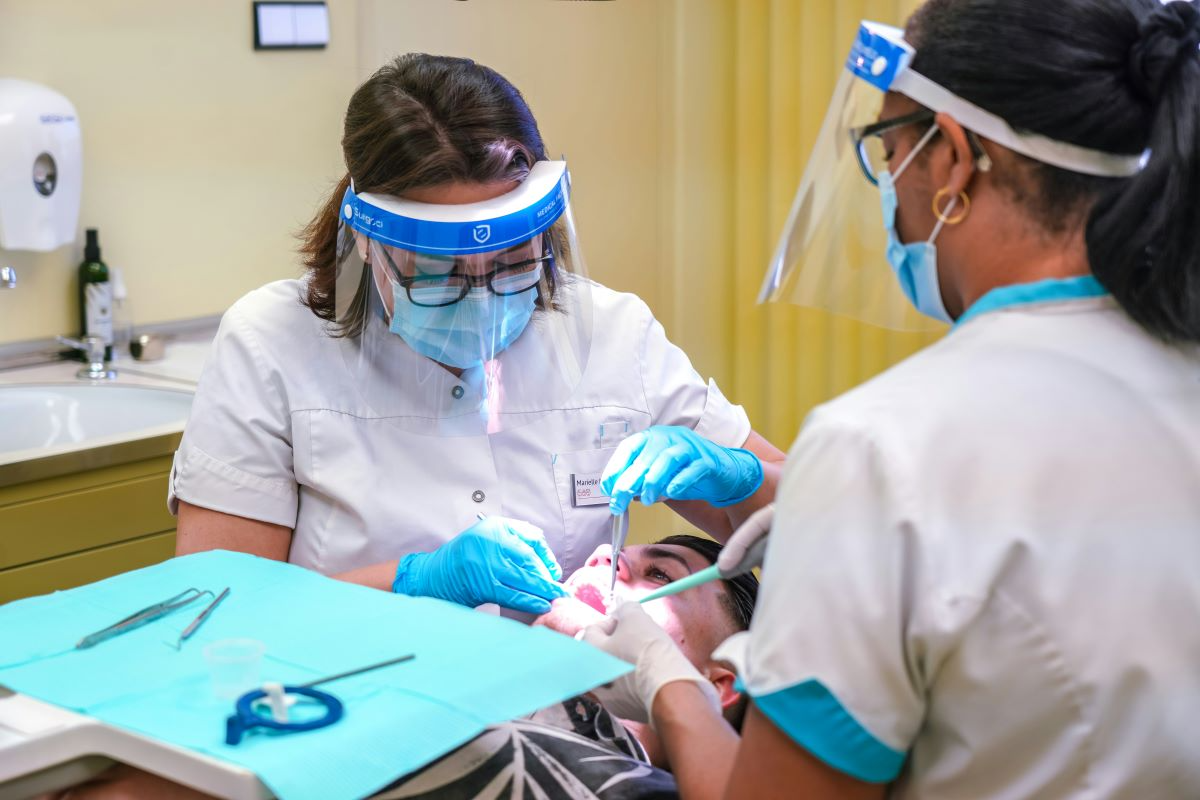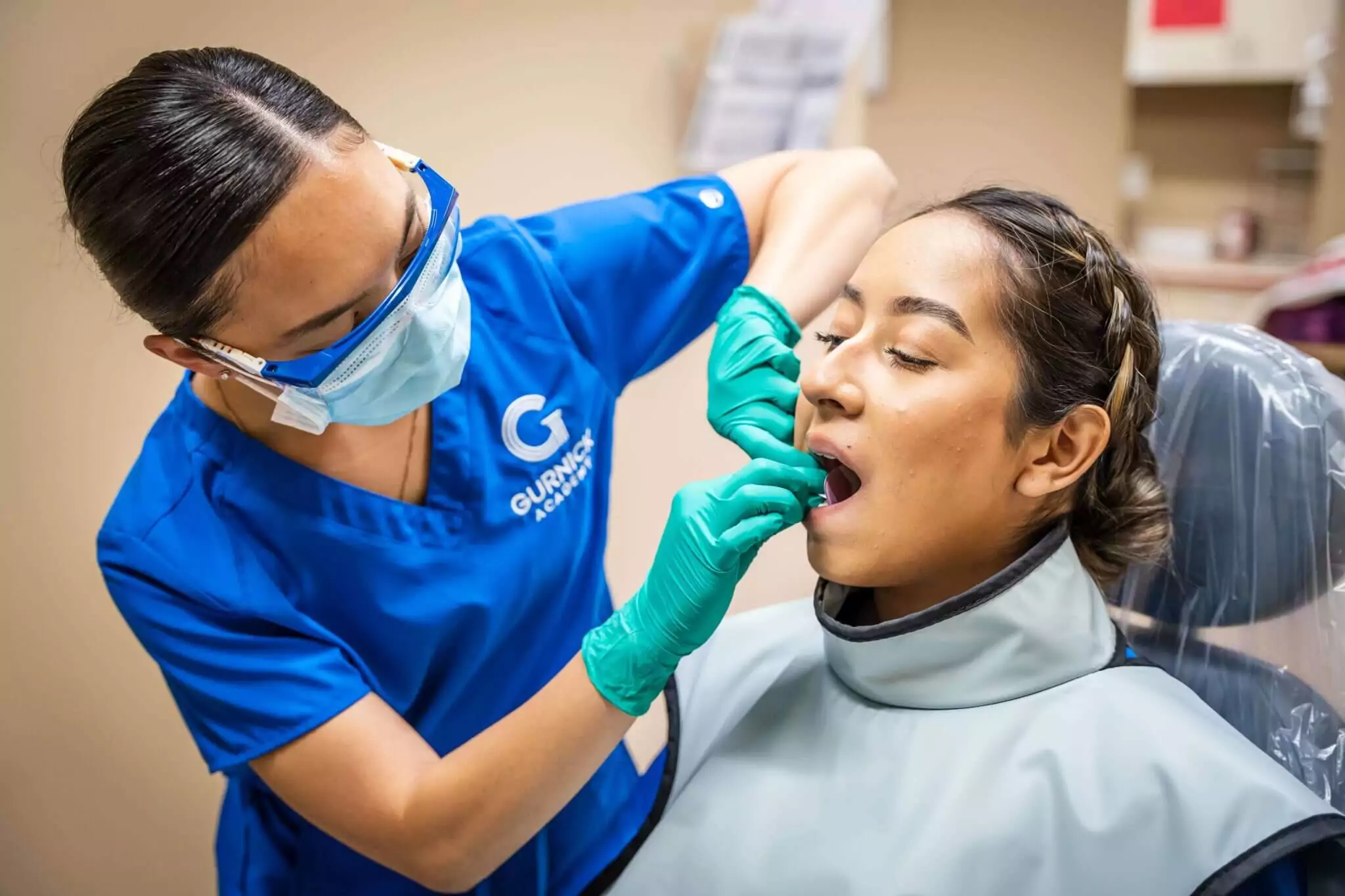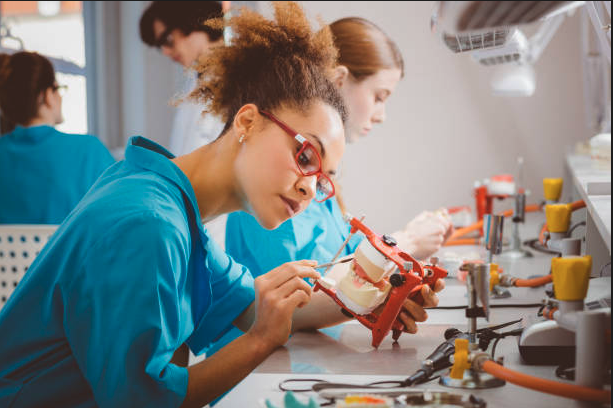Table of contents
Get Started with Kwikly
Get the latest updates, insights, and exclusive content delivered straight to your inbox.
Introduction to Dental Assisting
Dental assisting is a dynamic and rewarding career that combines hands-on patient care with essential administrative responsibilities. As a dental assistant, you become an integral part of the dental healthcare team, working closely with dentists, dental hygienists, and other professionals to ensure every patient receives the best possible care. Highly skilled dental assistants are valued for their ability to manage a variety of tasks, from preparing dental equipment and assisting with dental procedures to taking dental impressions and updating patient records.
A dental assistant’s job goes beyond the treatment room. You’ll often be the first point of contact for patients, helping them feel at ease and guiding them through their appointments. Your attention to detail is crucial when scheduling appointments, maintaining accurate patient records, and performing general office duties that keep the dental office running smoothly. Technical skills are just as important, as you’ll be responsible for sterilizing dental instruments, preparing materials, and supporting the dentist during procedures.
Dental assisting also means educating patients about proper dental hygiene and oral health, empowering them to take better care of their teeth. With the demand for dental assistants on the rise, this career offers both stability and the chance to make a real difference in patients’ lives. If you’re looking for a role that blends communication skills, technical know-how, and a passion for patient care, dental assisting could be the perfect fit.
Key Takeaways
- You need solid communication and listening skills to make patients feel good and work well with your team.
- Soft skills such as empathy and patience are also crucial for success as a dental assistant.
- Strong organizational and admin skills are a must for handling scheduling, keeping records straight, and staying compliant - it makes everything run smoother.
- You’ve got to keep learning and developing your technical skills to stay current and give patients better care.

Communication Skills
Good communication skills are what make any dental practice work. As a dental assistant, you’re usually the first person patients meet, so you need to get your point across clearly and show you care. Maintaining eye contact is essential for building rapport and trust with patients. Whether you’re booking appointments or explaining how to brush properly, how well you communicate can make or break the patient’s experience and help build that trust between the patient and your team.
Listening is just as important. When you really listen to patients, you get what they’re worried about, you can calm their nerves, and give them the reassurance they need, which greatly improves the patient's experience. This doesn’t just make patients happier - it also means you’re getting their needs and wants across to the dentist accurately. Being able to adapt how you talk helps you connect with all kinds of patients, so everyone gets the quality care they deserve.
Talking with your dental team matters just as much. When you relay information well between the dentist and other staff, everything clicks and procedures go off without a hitch. This teamwork is what keeps care standards high and makes the practice successful.
Administrative Skills
Admin skills are what keep a dental office running like clockwork. You play a big role in general office duties, such as scheduling appointments, keeping patient records updated, and handling general office stuff. Examples of administrative tasks include managing office operations, organizing patient files, ordering supplies, and supporting dental procedures to improve clinic efficiency. These tasks need you to pay close attention to details so the patient's medical history and new info stays accurate and current - that’s how you deliver quality care. A great dental assistant is what makes this level of efficiency happen.
You’ve got to stay compliant with rules like HIPAA when you’re managing patient records. You need to know medical file systems inside and out and keep everything confidential to protect patient privacy. Dental assistants must possess strong organizational skills to manage patient appointments and confidential records effectively, ensuring a well-organized workspace and proper filing of patient information. This attention to detail doesn’t just keep the office running smooth - it builds trust with patients too.
Handling all these admin tasks means you need strong organizational skills. From answering phones to managing lab work and handling lab duties, when you’re a skilled dental assistant who performs general office duties, you keep everything in order and help make the practice successful. These people skills, plus good time management, are what keep productivity up and patient care exceptional.
Attention to Detail
Paying attention to details is huge for dental assistants because it directly affects patient safety and how good the care is. Making sure you do tasks right and anticipating what the dental team needs are the basics of what you do. Whether you’re taking dental impressions or managing patient records, being meticulous is what gets you accurate results.
Infection control is another area where details really matter. You’re responsible for disinfecting instruments and treatment spaces, and that takes careful attention to make sure dental hygiene is proper and you prevent cross-contamination. This doesn’t just protect patients - it keeps the workspace safe for your dental team too.
Keeping a clean and organized workspace is another part of attention to detail that makes patient care better overall. When you keep the dental office well-organized, you can handle multiple tasks well without cutting corners on quality. This level of organization makes sure patient interactions go smoothly and all the supplies you need are right there when you need them. Personal responsibility is essential for maintaining these high standards, as it involves integrity, dedication, and a commitment to continuous learning in both professional and patient care responsibilities.
Organizational Skills
You need strong organizational skills to stay productive and keep workflow smooth in the dental office. Managing your dental office—including inventory, scheduling appointments, and keeping track of patient schedules—are just some of the tasks that need excellent organizational abilities. When you set up good systems and declutter workspaces, it really boosts your organizational skills and overall efficiency.
An organized work environment cuts down on disruptions, which means a smoother experience for patients and staff. For example, when you have a well-stocked inventory and dental supplies that are easy to get to, procedures can happen without delays, making the patient experience better. This kind of preparedness looks good on the dental practice and builds patient trust.
Multitasking is another big part of organizational skills. You work closely while juggling different responsibilities like helping patients, assisting the dentist, doing admin tasks, and managing other stuff. In addition to these duties, dental assistants also handle other tasks that support the practice, such as sterilizing instruments, preparing treatment rooms, and updating patient records. When you pay close attention to details and stay meticulous, you can handle all these tasks well without cutting corners on quality. This makes sure patient appointments and important medical documents get handled efficiently and accurately.
Technical Skills
Technical skills are a core part of what you do as a dental assistant. You need to be good with dental tools and equipment to support the dentist during procedures and make sure patients get high-quality care. This includes stuff like processing X-rays, preparing dental materials, performing laboratory duties as part of your technical responsibilities, and following strict infection control protocols to keep everything sterile. You also assist patients in and out of the dental chair to ensure their comfort and safety during procedures.
Infection control is a basic part of technical skills - you need to keep the office sterilized, sanitized, and clean. Sticking to these protocols doesn’t just protect patients, it makes sure the workspace is safe for your dental team too. Being good with dental tools and following infection control procedures makes up the core technical skills you need as a dental assistant.
Hands-on training and keeping up with learning play a big role in developing and maintaining these technical skills. Staying updated with the latest dental tech and techniques lets you give better support to the dentist and make the patient experience better overall. This commitment to technical excellence is what you need for a successful dental assisting career. Precision and care are especially important when working with a patient's teeth, as attention to detail directly impacts their oral health.
Compassion and Empathy
Compassion and empathy are vital for creating a welcoming vibe in the dental office and making patient care better. A lot of patients get anxious or scared when they visit the dentist, and many patients experience significant anxiety that requires extra understanding and support. When you’re compassionate, you can help ease those feelings. Keeping a friendly tone and attitude from the first interaction helps patient anxiety and makes them feel more comfortable.
Empathy plays a big role in understanding what anxious patients are worried about and giving them reassurance. For example, explaining procedures in simple terms and offering comfort items can really improve a nervous patient’s experience. These small gestures show that you genuinely care about the patient’s well-being, which builds trust and loyalty.
When you treat patients with compassion and empathy, it makes their overall experience better and helps them stay calm and open to treatment. This positive patient interaction is what builds long-term relationships and makes sure patients come back for future dental care. At the end of the day, compassion and empathy are key parts of a successful dental assisting career.

Critical Thinking and Problem-Solving
You need critical thinking and problem-solving skills to handle unexpected situations and make sure care stays quality. These are among the key skills needed for dental assistants, as both clinical and administrative competencies are essential for success in this role. In emergencies, your ability to think critically can lead to timely and effective patient care. This means analyzing patient information, anticipating what comes next in complex procedures, and making informed treatment decisions.
Promoting critical thinking within your dental team can make patient care and practice efficiency better overall. Key actions include:
- Training dental assistants to ask the right questions
- Building critical thinking during patient care
- Encouraging teamwork to effectively address any issues that come up
This makes sure your dental team can give the best possible care for patients.
Good problem-solving means you can quickly assess complex issues and come up with viable solutions. When you’re organized, you’re better equipped to manage multiple responsibilities and make sure you don’t get overwhelmed with your tasks. This level of preparedness and critical thinking is what you need to maintain a high standard of patient care and make sure the practice succeeds.
Professionalism in the Dental Office
Professionalism is what makes a dental assisting career successful. Conducting yourself with professionalism and ethical behavior is what you need to maintain patient trust and improve the overall patient experience. Professionalism directly influences the patient's experience by ensuring they feel comfortable, respected, and confident in the care they receive. Dental clinics expect you to uphold high standards of professionalism, which reflects well on the quality of care provided.
Your professionalism really impacts patient satisfaction. Being compassionate and empathetic towards patients can make their experience better during dental appointments, building trust and loyalty. When you’re detail-oriented in recording patient information, it helps you recognize signs of patient discomfort, which supports a professional relationship with patients.
Infection control and maintaining a clean dental office setting are also parts of professionalism. Following strict infection control procedures and maintaining a safe, hygienic dental environment shows you’re committed to patient care and safety. This level of professionalism is what you need for the success of the dental practice and patient well-being.
Dexterity and Manual Skills
You need dexterity and manual skills as a dental assistant because you require precision and control when handling dental tools during procedures. Superior manual dexterity is necessary for managing tools and helping the dentist effectively. You must have the skills to maneuver tools carefully in tight spaces, making sure patients stay safe and comfortable.
Practicing hobbies such as:
- Playing musical instruments
- Crafting can help you enhance your dexterity. These activities improve fine motor skills, which are what you need for tasks like:
- Sterilizing equipment
- Preparing dental materials.
Developing and maintaining excellent dexterity is key to performing dental procedures accurately and efficiently with dental instruments. During a dental procedure, dexterity ensures that each step is performed with the necessary precision and care.
Continuous Learning: Improving Your Dental Assistant Skills
You need continuous learning to stay updated with new dental techniques and technologies. Getting involved in ongoing professional development shows you’re committed to staying current in your field. Certification programs and continuing education courses help you maintain your certification and learn new skills, making you a more competitive job applicant.
Community colleges and professional organizations offer lots of continuing education opportunities for dental assistants. These programs give you hands-on training and insights into the latest industry trends, making sure states require dental assistants are well-equipped to provide high-quality care through on the job training.
A commitment to continuous learning doesn’t just enhance your career growth - it also contributes to the overall success of the dental practice. According to recent labor statistics, the job outlook for dental assistants is strong, with industry growth and demand expected to continue rising.
Career Advancement and Opportunities
Dental assisting is more than just a job—it’s a career with plenty of room to grow. As you gain experience and expand your skill set, you’ll find a variety of advancement opportunities within the dental field. Many dental assistants choose to specialize in areas like orthodontic assisting, pediatric dentistry, or dental laboratory technology, allowing them to focus on specific aspects of dental care and procedures.
With additional education and training, some dental assistants transition into roles such as dental hygienist or dental office manager, taking on more responsibility and leadership within the dental practice. Others may become dental assistant instructors, sharing their knowledge and experience with the next generation of dental professionals. The skills you develop in dental assisting—such as attention to detail, patient care, and strong organizational abilities—are highly transferable and valued in many healthcare settings.
Whether you’re interested in clinical work, administrative leadership, or education, dental assisting offers a clear path for professional growth. By staying committed to continuous learning and seeking out new challenges, you can build a long and fulfilling career in the dental field.

Summary
Mastering the top 10 essential skills of a dental assistant is what you need to excel in your career and provide exceptional patient care. From effective communication and administrative skills to technical know-how and continuous learning, each skill plays a vital role in making sure you have a successful dental assisting career. When you develop and sharpen these skills, you can make a real impact on the dental practice and the patients you serve, especially dental patients who rely on your expertise and professionalism for their comfort and care.
In conclusion, embracing these essential skills will not only boost your professional growth but also improve the overall patient experience. As an essential member of the dental healthcare team, your commitment to continuous learning, compassionate care, and maintaining high standards of professionalism ensures you’re well-positioned to thrive in your career. Stay dedicated, keep learning, and continue to make a positive difference in your patients’ lives.
Frequently Asked Questions
What are the most important communication skills for a dental assistant?
Effective communication skills, especially active listening and adaptability, are what you need as a dental assistant to improve patient experiences and teamwork in the dental setting. Focusing on these skills creates a more efficient and supportive environment for both patients and staff.
Why are administrative skills important for dental assistants?
Administrative skills are essential for you as a dental assistant because they help with efficient appointment scheduling, patient record management, and overall office operations, making sure the practice runs smoothly and effectively.
How does attention to detail impact a dental assistant's role?
Attention to detail is huge for you as a dental assistant because it ensures patient safety, accurate record-keeping, and effective task management. This careful approach ultimately makes the quality of patient care better and keeps your work environment organized.
What role does continuous learning play in a dental assistant's career?
Continuous learning is crucial for you as a dental assistant because it keeps you informed about the latest techniques and technologies, which boosts your skills and improves patient care. This commitment to ongoing education ultimately supports your career advancement and professional competence.
How can dental assistants improve their dexterity and manual skills?
You can improve your dexterity and manual skills as a dental assistant by getting into hobbies like playing musical instruments or crafting, since these activities sharpen the fine motor skills you need for handling dental tools with precision.








